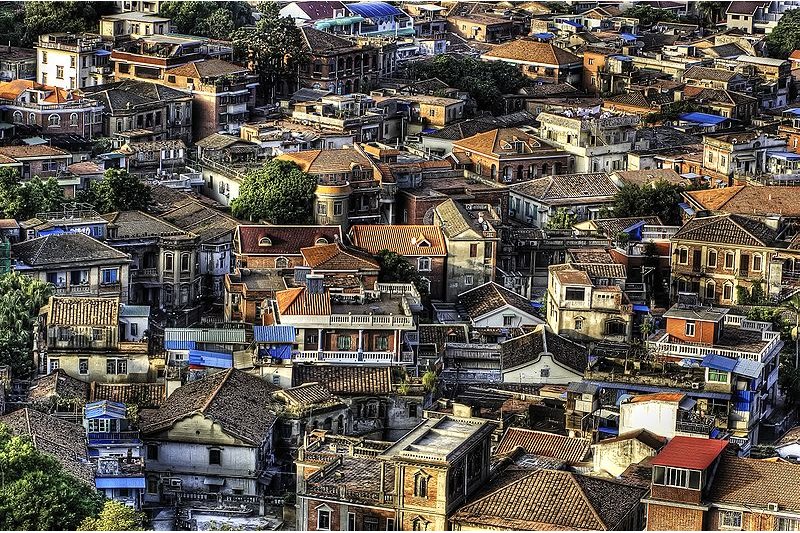 Wuyi Mountains in Fujian, China
Wuyi Mountains in Fujian, ChinaSource: https://commons.wikimedia.org/wiki/File:Wuyi_Mountains_Sea_of_clouds.jpg
Author: 老过

Fujian Province 福建省 is a province located in Southern China. Covering 121,400 sq km (46,900 sq mi), it is the 23rd largest out of the 33 administrative divisions of China (inc. Taiwan, SARs and autonomous regions). It has a population of 37 million (2011 estimate), placing it in 18th position. The name Fujian is a portmanteau of Fuzhou and Jianzhou, the names of two major cities in the province during the Tang Dynasty. Today within the Fujian province are the archipelagoes of Kinmen and Matsu which are still controlled by the Republic of China (Taiwan). These are called Fujian Province (ROC) while the rest is administered by the People's Republic of China.
The Fujian coast of China has been inhabited since the Neolithic period, around the middle of the 6th millennium BC. It is a mountainous province. The highest altitude being the Wuyi Mountains on the northwest part of the province. The province borders Zhejiang Province to the north, Jiangxi Province to the east and Guangdong Province to the south. It faces the East China Sea to the east and South China Sea to the south.
The main river through Fujian Province is the Min River which gives its name to the local dialects. The Hokkien people is the main group in Fujian Province. They are subdivided according to their city of origin, and speak dialects with slight differences city to city. Other large subgroups living in Fujian Province includes the Teochew people, the Foochow people, the Hoklo people and Putian people. In addition, the Hakka is a group which migrated (in successive waves) to Fujian Province, as well as Guangdong Province, Jiangxi Province and other parts of China, from the Han Dynasty (202BC-AD220) right up to the Qing Dynasty in the 17th century.
 Sanqingshan Mountain, Fujian Province
Sanqingshan Mountain, Fujian Province
Author: 老过

Fujian Province 福建省 is a province located in Southern China. Covering 121,400 sq km (46,900 sq mi), it is the 23rd largest out of the 33 administrative divisions of China (inc. Taiwan, SARs and autonomous regions). It has a population of 37 million (2011 estimate), placing it in 18th position. The name Fujian is a portmanteau of Fuzhou and Jianzhou, the names of two major cities in the province during the Tang Dynasty. Today within the Fujian province are the archipelagoes of Kinmen and Matsu which are still controlled by the Republic of China (Taiwan). These are called Fujian Province (ROC) while the rest is administered by the People's Republic of China.
Major Cities of Fujian Province
Fujian Province comprises one sub-provincial city, Xiamen, and eight prefecture-level cities.World Heritage Sites in Fujian Province
- Fujian Tulou (2008)
- Mount Wuyi (1999)
Tourist Attractions Fujian Province
- Guanghua Temple, Putian
- Gulangyu Island, Xiamen
- Kaiyuan Temple, Quanzhou
- Meizhou Island Matsu Pilgrimage Centers, Putian
- Mount Tailao, Fuding
- Nanshan Temple, Zhangzhou
- Yongquan Temple, Fuzhou
The main river through Fujian Province is the Min River which gives its name to the local dialects. The Hokkien people is the main group in Fujian Province. They are subdivided according to their city of origin, and speak dialects with slight differences city to city. Other large subgroups living in Fujian Province includes the Teochew people, the Foochow people, the Hoklo people and Putian people. In addition, the Hakka is a group which migrated (in successive waves) to Fujian Province, as well as Guangdong Province, Jiangxi Province and other parts of China, from the Han Dynasty (202BC-AD220) right up to the Qing Dynasty in the 17th century.
 Sanqingshan Mountain, Fujian Province
Sanqingshan Mountain, Fujian ProvinceSource: https://commons.wikimedia.org/wiki/File:SanQingShan10.jpg
Author: Emitchan

Upheavals in Fujian Province during the 16th and 17th centuries caused many ethnic Fujian Chinese to leave their homeland, and today many of the ethnic Chinese living in Southeast Asia trace their ancestry back to Fujian Province. This includes the majority of the ethnic Chinese people living in Taiwan, Singapore, Malaysia, Indonesia and the Philippines.
The main international airports serving Fujian Province are the Xiamen Gaoqi International Airport (POJ) and the Fuzhou Changle International Airport (FOC). The Xiamen airport is the 10th biggest in China. It is the homebase of Xiamen Airlines, and receives flights from all the major cities of China, as well as from Amsterdam, Hong Kong, Kuala Lumpur, Macau, Seoul, Singapore, Taipei and Tokyo. Both Xiamen and Fuzhou airports are now allowed to receive flights from Taiwan.
By Train
Xiamen is linked to other major cities of China by rail. There is also a high-speed train service connecting it with Ningbo, Hangzhou and Shanghai.
 Gulangyu Island in Xiamen, Fujian Province
Gulangyu Island in Xiamen, Fujian Province
Author: Emitchan

Upheavals in Fujian Province during the 16th and 17th centuries caused many ethnic Fujian Chinese to leave their homeland, and today many of the ethnic Chinese living in Southeast Asia trace their ancestry back to Fujian Province. This includes the majority of the ethnic Chinese people living in Taiwan, Singapore, Malaysia, Indonesia and the Philippines.
Going to Fujian Province
By PlaneThe main international airports serving Fujian Province are the Xiamen Gaoqi International Airport (POJ) and the Fuzhou Changle International Airport (FOC). The Xiamen airport is the 10th biggest in China. It is the homebase of Xiamen Airlines, and receives flights from all the major cities of China, as well as from Amsterdam, Hong Kong, Kuala Lumpur, Macau, Seoul, Singapore, Taipei and Tokyo. Both Xiamen and Fuzhou airports are now allowed to receive flights from Taiwan.
By Train
Xiamen is linked to other major cities of China by rail. There is also a high-speed train service connecting it with Ningbo, Hangzhou and Shanghai.
 Gulangyu Island in Xiamen, Fujian Province
Gulangyu Island in Xiamen, Fujian ProvinceSource: https://commons.wikimedia.org/wiki/File:Gulangyu.jpg
Author: Jakob Montrasio

Looking for information on Penang? Use this Map of Roads in Penang to zoom in on information about Penang, brought to you road by road.

Author: Jakob Montrasio

List of Provinces in China
 Latest updates on Penang Travel Tips
Latest updates on Penang Travel Tips
 Map of Roads in Penang
Map of Roads in Penang
Looking for information on Penang? Use this Map of Roads in Penang to zoom in on information about Penang, brought to you road by road.
Copyright © 2003-2025 Timothy Tye. All Rights Reserved.

 Go Back
Go Back